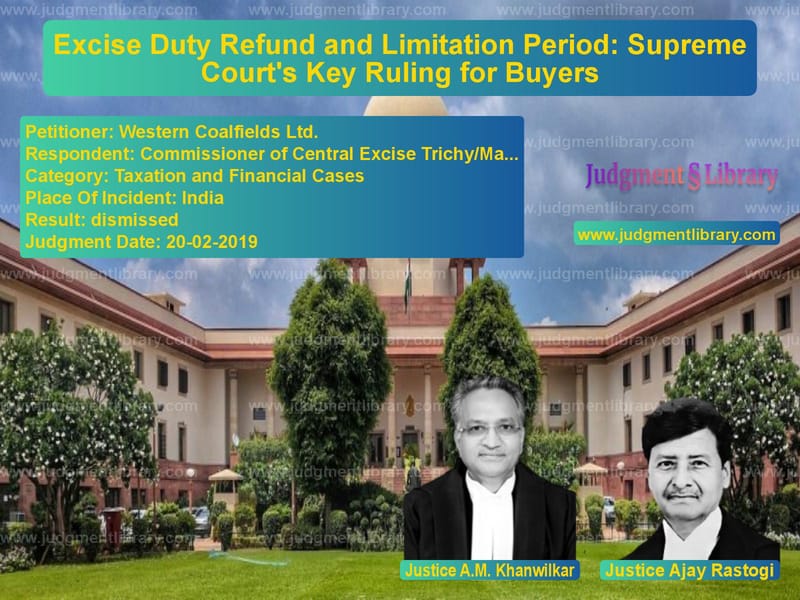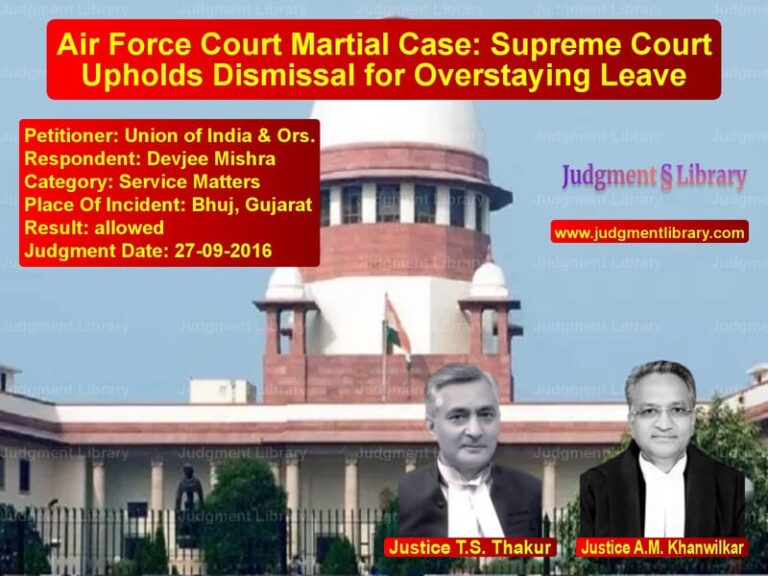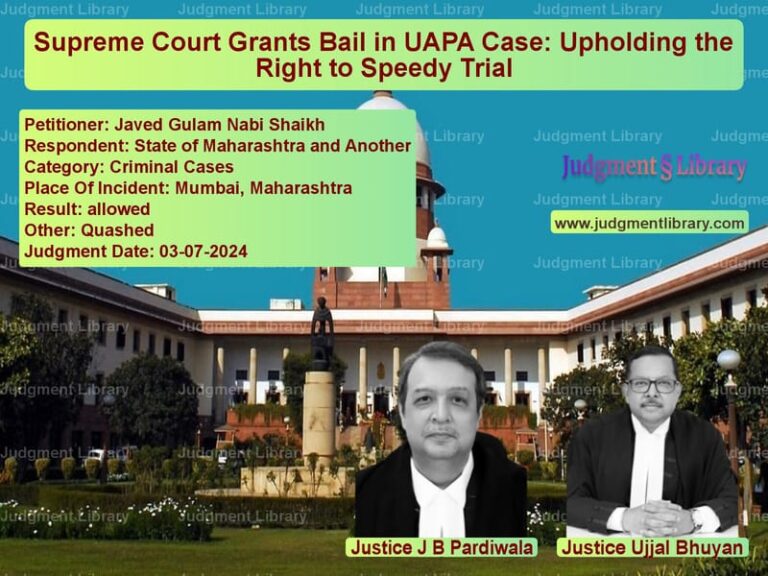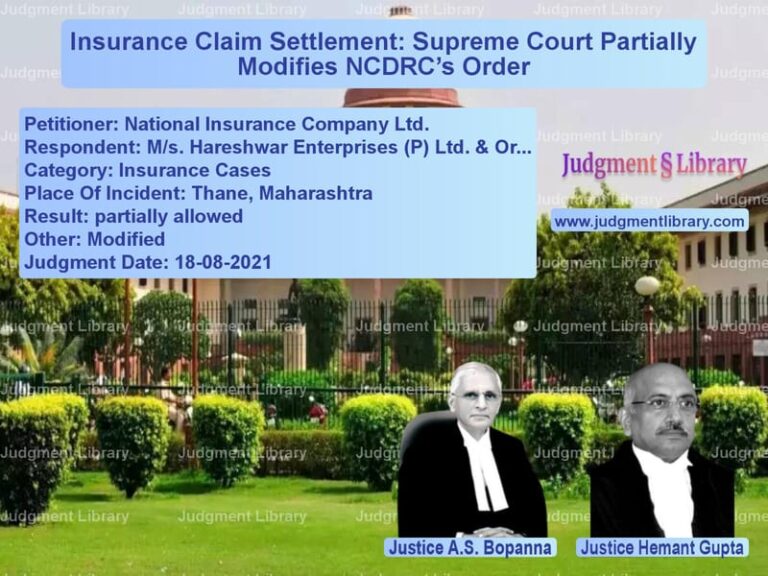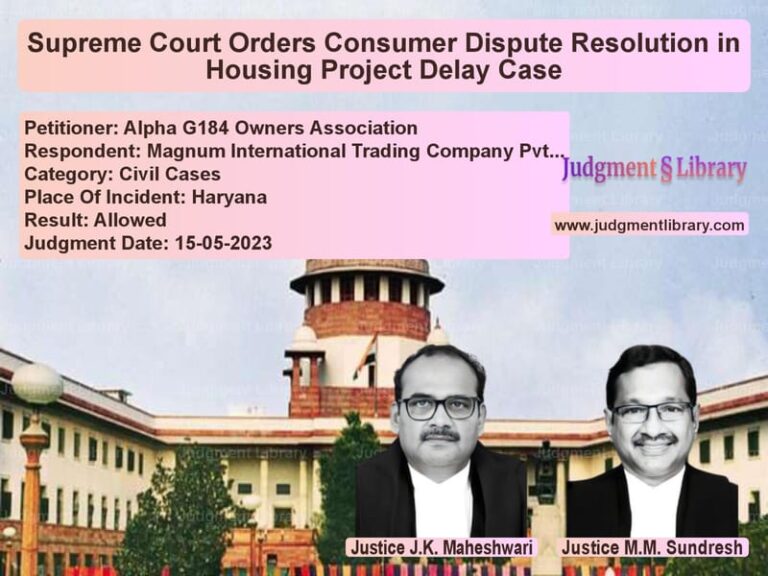Excise Duty Refund and Limitation Period: Supreme Court’s Key Ruling for Buyers
The Supreme Court of India recently pronounced a significant ruling in the case concerning the refund of central excise duty paid under protest. This case primarily revolved around whether the limitation period of six months under Section 11B of the Central Excise Act, 1944, applies when the refund claim is made by a buyer rather than the manufacturer. The judgment has far-reaching implications for businesses and tax authorities in handling excise duty disputes.
Background of the Case
The matter began when Western Coalfields Ltd. (WCL), a public sector company engaged in coal mining, sought a refund of excise duty that had been paid by M/s. Fenner (India) Ltd., the manufacturer of conveyor beltings. The excise duty had been paid under protest due to an ongoing dispute over the classification of the product. Eventually, the Supreme Court ruled in a prior judgment that the conveyor beltings were misclassified, leading WCL to file a refund claim for the excise duty amount.
Issues Before the Court
The Supreme Court had to address the following key legal questions:
- Does the six-month limitation period under Section 11B apply to refund claims made by a buyer?
- Can the buyer avail the benefit of an extended timeline because the manufacturer paid the duty under protest?
- Are the rights of a manufacturer and a buyer treated distinctly in excise duty refund claims?
- Does the doctrine of unjust enrichment apply in this case?
Petitioner’s (Western Coalfields Ltd.) Arguments
The counsel for Western Coalfields Ltd. made the following arguments:
- The duty had been paid under protest by M/s. Fenner (India) Ltd., and as the ultimate buyer, WCL bore the financial burden.
- Since the manufacturer’s duty was under protest, the limitation period of six months should not apply to the buyer’s claim.
- The refund should be granted as the tax authority had wrongly classified the product, leading to an undue burden on WCL.
- The manufacturer did not apply for a refund, but the buyer, who ultimately bore the cost, should be entitled to recover the amount.
- Tax authorities should not be allowed to benefit from an incorrect classification at the expense of the taxpayer.
Respondent’s (Commissioner of Central Excise) Arguments
The tax authority, represented by the Commissioner of Central Excise, contested the refund claim on the following grounds:
- The refund claim was filed well beyond the prescribed six-month limitation period.
- The manufacturer and buyer are separate legal entities under the Central Excise Act.
- The buyer cannot claim an extended timeline just because the manufacturer paid the duty under protest.
- As per the doctrine of unjust enrichment, refunds should not be granted if the incidence of duty has already been passed to consumers.
- The Supreme Court had previously ruled in Commissioner of Central Excise, Mumbai-II v. Allied Photographics India Ltd. that the rights of a manufacturer and buyer are distinct and must be considered separately.
Supreme Court’s Observations
The Supreme Court analyzed Section 11B of the Central Excise Act, which governs refund claims, and made the following observations:
“The scheme of Section 11B makes a clear distinction between the right of the manufacturer to claim a refund and the right of the buyer. The law mandates that any claim must be made within six months from the relevant date, and the limitation period applies separately to both parties.”
The Court reaffirmed its earlier judgment in Commissioner of Central Excise, Mumbai-II v. Allied Photographics India Ltd. that a buyer’s refund claim must be filed within six months from the date of purchase. The Court further noted that the manufacturer’s act of paying duty under protest does not automatically extend the timeline for the buyer.
Key Findings of the Judgment
After considering the arguments, the Supreme Court arrived at the following conclusions:
- The six-month limitation under Section 11B applies to refund claims filed by buyers.
- The manufacturer’s payment of duty under protest does not extend the time available to the buyer for filing a refund claim.
- The buyer and the manufacturer have separate legal standing in excise duty refunds.
- The doctrine of unjust enrichment applies, meaning a refund is only granted if the duty burden was not passed on to another party.
- The refund application filed by WCL was time-barred and thus rightly rejected by tax authorities.
Legal Precedents Cited
The Supreme Court referred to multiple legal precedents to substantiate its ruling. These include:
- Commissioner of Central Excise, Mumbai-II v. Allied Photographics India Ltd. – Held that the limitation period applies distinctly to manufacturers and buyers.
- National Winder v. Commissioner of Central Excise, Allahabad – A contrary view that was overruled as per incuriam.
- Fenner India Ltd. v. Collector of Central Excise – Addressed classification disputes in excise duty cases.
Impact of the Judgment
The ruling has significant implications for businesses and tax authorities:
- Buyers must ensure timely filing of refund claims within the six-month period.
- Manufacturers paying duty under protest should also file timely refund claims if they intend to recover the amount.
- Tax authorities have clarity on the separate legal standing of buyers and manufacturers.
- Businesses must carefully assess whether they have passed on the duty burden before applying for a refund.
Conclusion
The Supreme Court’s judgment in this case reiterates the importance of adhering to statutory timelines when seeking refunds under the Central Excise Act. Buyers cannot rely on a manufacturer’s protest payment to extend their own refund deadlines. The ruling reinforces strict compliance with procedural laws and ensures a clear distinction between the rights of manufacturers and buyers in excise duty matters.
Petitioner Name: Western Coalfields Ltd..Respondent Name: Commissioner of Central Excise Trichy/Madurai.Judgment By: Justice A.M. Khanwilkar, Justice Ajay Rastogi.Place Of Incident: India.Judgment Date: 20-02-2019.
Don’t miss out on the full details! Download the complete judgment in PDF format below and gain valuable insights instantly!
Download Judgment: Western Coalfields L vs Commissioner of Cent Supreme Court of India Judgment Dated 20-02-2019.pdf
Direct Downlaod Judgment: Direct downlaod this Judgment
See all petitions in Tax Refund Disputes
See all petitions in Income Tax Disputes
See all petitions in Customs and Excise
See all petitions in Judgment by A M Khanwilkar
See all petitions in Judgment by Ajay Rastogi
See all petitions in dismissed
See all petitions in supreme court of India judgments February 2019
See all petitions in 2019 judgments
See all posts in Taxation and Financial Cases Category
See all allowed petitions in Taxation and Financial Cases Category
See all Dismissed petitions in Taxation and Financial Cases Category
See all partially allowed petitions in Taxation and Financial Cases Category

